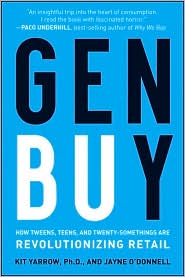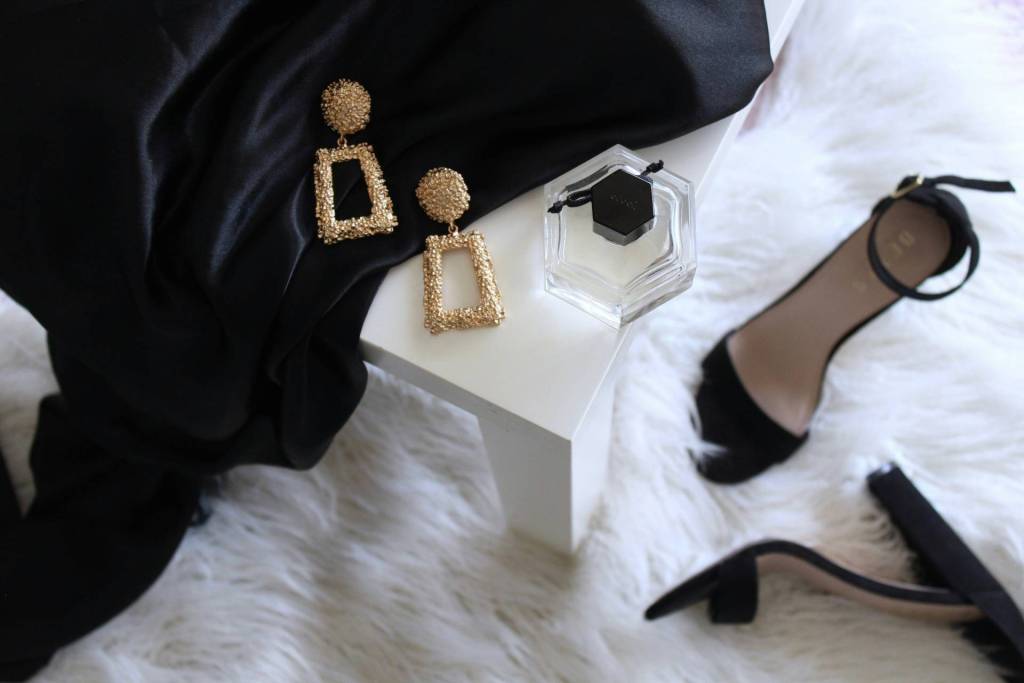Today, I spoke to Kit Yarrow, who is the co-author of Gen BuY: How Tweens, Teens and Twenty-Somethings are Revolutionizing Retail. In this interview, Kit sizes up the typical Gen-Y’er, explains how this group is different than other generations, illustrates how they’ve influenced the workplace and buying, shares some highlights from her research, what motivates them and more.
Can you size up what a typical Gen-Y’er behavior is? How are they different from other generations?
First and foremost they’re more confident than previous generations were  at their age. They’re the product of a more child-centric society, the self-esteem movement and a culture that values youth. They’ve been appreciated and understood in a way that’s really unique. Add to that teamwork, and the ability to use technology to connect with others and circumvent traditional hierarchies and you’ve got an empowered and confident generation.
at their age. They’re the product of a more child-centric society, the self-esteem movement and a culture that values youth. They’ve been appreciated and understood in a way that’s really unique. Add to that teamwork, and the ability to use technology to connect with others and circumvent traditional hierarchies and you’ve got an empowered and confident generation.
How has Gen-Y influenced how businesses run, from a workplace and buying perspective?
Obviously technology is a key factor. What I hear most often – that Gen Y’ers “embrace” technology – is actually only a small part of why this is so important. More essential is the mentality that has resulted from having grown up with all that technology has to offer. Certainly Gen Y’ers get bored more easily than older generations and process surface information more quickly. They also have a fundamental appreciation for innovation and new ideas. And as mentioned earlier – they’re better at moving around obstacles and can call upon a pack of real or virtual friends for back up when they need it. Anywhere, anytime is part of it too.
Marketers and retailers are not only using technology more effectively as a result, but also relying more on visual cues, rotating merchandise more quickly, tying in with causes and events and giving consumers more control over their messaging.
During your research for this book, what were the top 3 most fascinating statistics you found?
Some of the findings I found most interesting were actually contradictions that arose when comparing surveys – and the unique and inventive ways that Gen Y’ers responded to internal conflicts.
For example, compared with other generations Gen Y’ers are more passionate supporters of sustainability. But they’re also relatively heavy purchasers of clothing. One of the ways that many of the Gen Yers I interviewed were dealing with this conflict was by shopping at second hand stores.
Another source of conflict I saw in twenty-something Gen Y’ers was between the high standards they had for themselves and struggles feeling satisfied with life choices. They’d been told they could “do anything” and “not to settle” and so despite relatively high self-esteem many felt a lot of anxiety and doubt about their career (and even mate) selections. The solution for many was a dedication to continuously learning and trying new things.
As for straight up numbers, according to our Gen BuY survey of 2,000 American consumers, Gen Y is enthusiastic about shopping. Of those under 30, 44% say they “love shopping” compared to 31% of those over 30. Add in “like shopping” and the numbers are 71% of Gen Y and 48% of those over 30.
Another interesting statistic, according to Nielsen Online, time spent online by kids 2-11 has increased 63% in the past five years compared a 36% increase across all ages.
What motivates a Gen-Y’er?
Generally speaking, Gen Y is motivated by innovation. They like new and different things, and stimulation. They also appreciate and expect feedback more than other generations. And whether online or in-person, Gen Y is motivated by belonging and performs better when they feel part of a team.
Can you spotlight a Gen-Y’er you interviewed for your book and go over how they feel like they are different from other generations?
One of the things I found most charming about the Gen Y’ers I interviewed – whether they were 10 to 29 – was their awareness and appreciation of their parents. One 29 year-old woman I interviewed was in awe of the sacrifices her parents had made for her. For example, she commented that while she liked to dine out several times a week, her parents considered it a special occasion. And while neither had been able to afford college themselves, they insisted that she go and scrimped to pay for her education.
There’s much discussion about Gen Y feeling “entitled.” While evidence of high expectations may surface in surveys, when you sit down and talk to Gen Y’ers, most seem to be very aware of the price attached to their expectations. They feel fortunate and grateful. That’s not the same as being entitled – entitlement includes ignorance.
——–
Kit Yarrow is co-author, with Jayne O’Donnell of USA Today, of Gen BuY: How Tweens, Teens and Twenty-Somethings are Revolutionizing Retail. Kit Yarrow chairs the psychology department of Golden Gate University, where she is professor of psychology and marketing. She is the university’s 2009 Outstanding Scholar for her research on consumer psychology. Kit has taught consumer behavior at universities around the world, from Slovenia to Malaysia, including the Helsinki School of Economics and U.C. Berkeley. Yarrow has appeared on ABC World News, Good Morning America, CNN and NPR, and has been quoted in publications such as The New York Times, The Wall Street Journal, and U.S. News & World Report. She blogs for SFGate.com and Psychology Today. Visit www.genbuy.net to learn more about the psychology of Gen Y and shopping.













